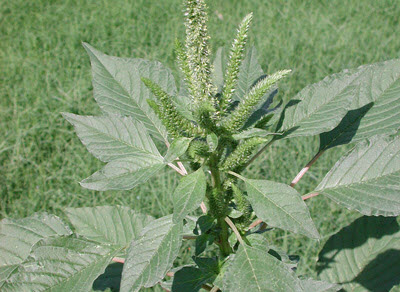A Federal Court ordered the removal of genetically modified beet seedlings. After USDA and Monsanto appealed, the Ninth Circuit Court of Appeals is delaying the removal until a hearing that was rescheduled for February.
|
|
|||
|
While Monsanto shelved its research on genetically modified wheat in 2004 amid broad opposition from consumers and growers, it’s back at it again. While still under investigation for anti-competitive patent practices and under a threat of an anti-trust case against them, Monsanto is busy tackling other issues. Superweeds are invading fields across the globe. Before we start looking blaming farmers, however, careful attention must be paid to government agencies and seed companies and how the two partner-up to foster the conditions that lead to superweeds. Federal Court finds that Plaintiffs are likely to succeed on their claims that the Animal and Plant Health Inspection Services illegally permitted the planting of genetically engineered sugar beet. Monsanto says it’s cutting about 650 to 700 more jobs as it continues to restructure its business, according to a story we first read on NPR on August 31st 2010. In depth analysis of Judge White’s decision which rescinded USDA’s and APHIS’ decision to deregulate Roundup Ready sugar beets without conducting an Environmental Impact Statement. Last week, superweeds and GMOs were on the minds of many U.S. lawmakers. Reports continued on growing pesticide resistance. Bee colony collapse problem grows. EPA considers giving environmental justice a chance. EU approved more GM maize imports, while a GMO-Free Europe conference nears. And more. The latest stories: Organic pest management proven to be better than pesticides. Chemical farming interests boost anti-pesticide message. GE tree trials continue. Why do we need GM potatoes? GM contamination lawsuits. Personal story about becoming a locavore. And more. The next generation of biotech crops are designed to express alleged nutritional benefits. However, advertising such foods as “healthy” would only confuse the consuming public. The United States Supreme Court handed down its first ever decision concerning genetically modified crops and it is a mixed result for farmers, consumers and environmental groups. We review and provide legal analysis of the oral argument in the Monsanto v Geertson matter heard recently by the Supreme Court. Monsanto has crops resistant to glyphosate. Bayer is selling cotton and soybeans resistant to glufosinate, another weedkiller. Monsanto’s newest corn is tolerant of both glyphosate and glufosinate, and the company is developing crops resistant to dicamba, an older pesticide. Syngenta is developing soybeans tolerant of its Callisto product. And Dow Chemical is developing corn and soybeans resistant to 2,4-D, a component of Agent Orange, the defoliant used in the Vietnam War. Monsanto claims that it is pursuing a legal battle over the right to grow genetically modified alfalfa because it is concerned with farmers, fairness and choice. Yet Monsanto’s appeals in the case have a lot more to do with protecting its right to continue selling GM seeds and pesticides. Today, the U.S. Supreme Court is hearing oral arguments in the case of Monsanto v. Geertson Seed Farms. At stake is a decision issued by California District Court which issued a permanent injunction against any further planting of genetically engineered alfalfa crop in 2007. After airing another arguably favorable report on genetically modified crops without acknowledging Monsanto as Marketplace’s sponsor, the program is soliciting listeners’ comments as to whether the program should announce Monsanto’s sponsorship when airing reports discussing Monsanto and their products. On March 16, 2010, a California District Judge denied plaintiffs’ request to halt the planting of GE sugar beets. The Court’s decision, however, left open the possibility of a ban, which is to be determined at the permanent injunction hearings in July. After nearly a two-hour hearing yesterday, the U.S. District Judge Jeffery White reserved judgment as to whether a preliminary injunction, that would prevent the production or planting of genetically modified sugar beet seeds, should issue. Both parties, however, expect a quick decision as farmers will soon be ready to plant their crop. Organic farmers and environmental groups will seek this week an injunction to stop the planting of the GM beets until the U.S. Department of Agriculture’s Animal and Plant Health Inspection Service (“APHIS”) conducts an environmental impact statement (“EIS”). The lawsuit also seeks to bar the sale of sugar made from GM modified beets. In December 2009, the USDA has released its draft environmental impact statement proposing to deregulate Monsanto’s genetically engineered alfalfa. GMO Journal submitted its public comment to the agency urging it to continue regulating GE alfalfa. There is still time to take action before the March 3, 2010 deadline. Do you part — tell USDA to reject Monsanto’s GE alfalfa. There is little doubt that Monsanto-farmer contracts are fundamentally unfair to the farmers. In this case, David does not fair well against Goliath. But are such agreements also fundamentally unfair to society because, unless you grow it yourself, what the farmer grows is what you eat. We’ve all been told: consume Omega-3 fatty acids, usually found in cold water oily fish, for better health. But we’ve also been warned: with global fish stocks in decline, if everyone consumed the recommended amounts of fish in order to obtain enough Omega-3s, the results would be catastrophic for wild fish. Enter Monsanto: with the collaboration of Solae, the company has developed a soybean that has been genetically engineered to contain the Omega-3 fatty acids. |
|||
|
 |
|||















